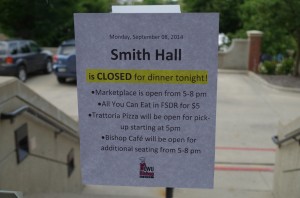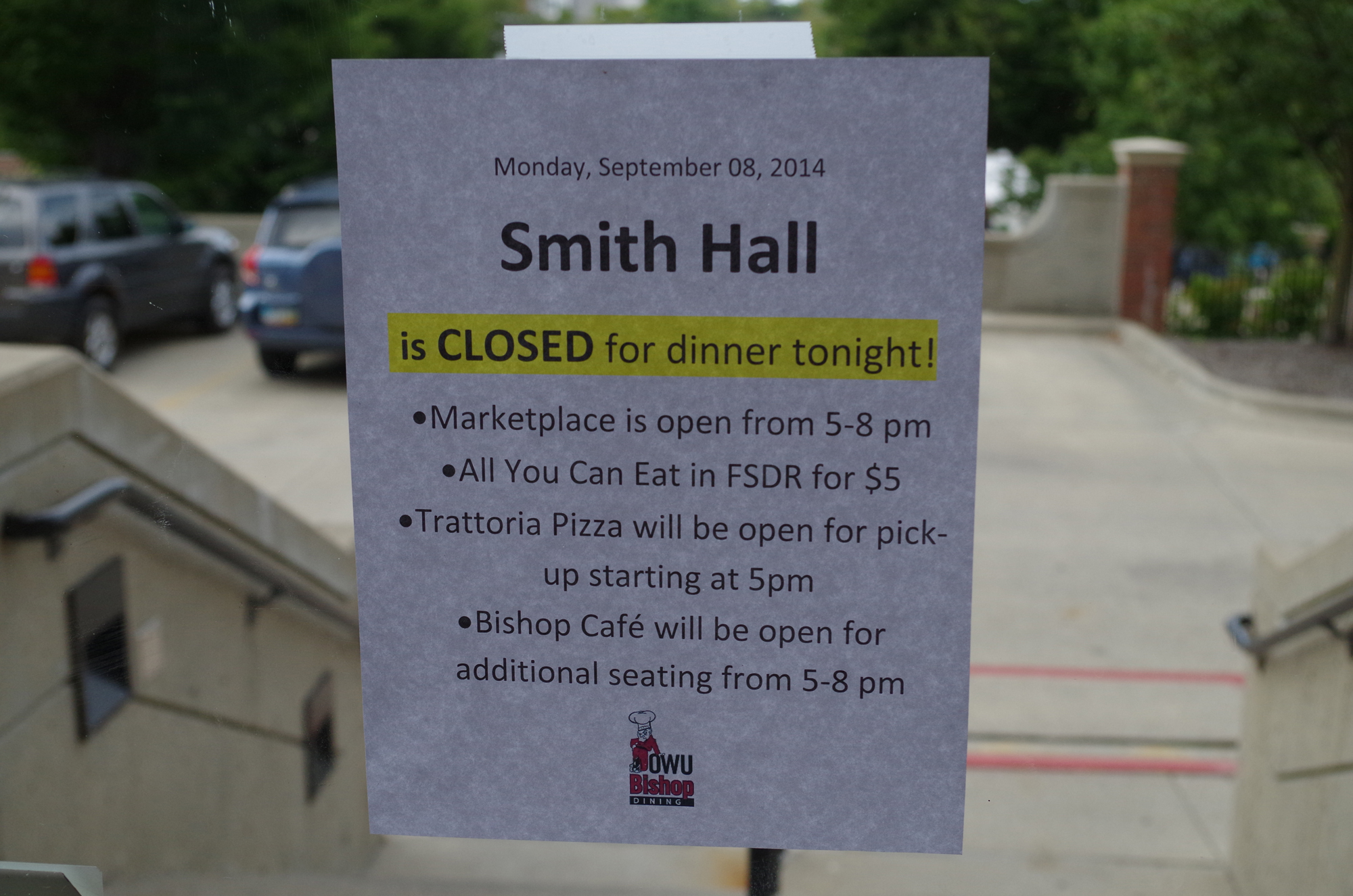
Chartwells resumed services Tuesday after repairs
A Delaware sanitarian’s surprise inspection of Smith Hall’s cafeteria got a surprise of its own when a second floor pipe burst, leaking water through the ceiling.
“We really don’t have control over anything like that – nobody does, to be honest,” said Chartwells’ Dining Services Manager, Deanna Park. Due to the leak, they closed Smith for dinner on Monday, Sept. 8.
The Buildings and Grounds staff was repairing the pipe while the sanitarian was assessing Smith dining hall, according to Park. When they fixed it the sudden increase in water pressure burst the older pipe, placed above the cafeteria’s ice cream station. Three ceiling tiles were knocked out as water leaked through, pooling on the floor.
“The fitting was replaced this morning, the affected areas have been cleaned and the ceiling tiles have been replaced,” said Buildings and Grounds Director Peter Schantz on Sept. 9.
“The area was functional again before noon today.”
While Chartwells made the decision to close voluntarily, Delaware sanitarian Karie Sanders was still at the site and discussed the issue with them.
“We try to work closely with facilities when they’re going through moments where they need a little extra assistance to help get things back on the right path,” she said.
With Smith dining closed, Chartwells opened the Faculty Staff dining room in Hamilton-Williams Campus Center as an additional place to pick up food, and opened seating in Bishop Cafe.
While sophomore Robyn Madrishin was working and not affected by the change in options, she noted that the school seemed well prepared, saying there was extra food in Hamilton-Williams.
Park noted that they were able to cook food in part of Smith cafeteria and take it to Hamilton-Williams to help with the additional amount of students eating there.
With the repairs finished Sept. 9, Sanders returned to check the repairs to the pipe and how it was affecting service, and again on Sept. 11 to check progress on several code violations she found – five critical violations and nine standard violations.
“Critical means they are linked to or could be linked to causing foodborne illness, so in that case we get those corrected on the spot, which they were corrected on the spot,” Sanders said.
Sanders has been inspecting Smith Hall for seven and a half years; inspections are unannounced to Chartwells and generally occur every six months. Violations lead to return visits.
“We do corrective action as soon as possible…some of those were corrected before the sanitarian left,” said Park.
“Also we work in cooperation with Buildings and Grounds, they’re helping to get any parts needed, we’re making additional changes to that and we will be re-inspected and we fully anticipate everything to be corrected at that point.”
She emphasized, as did Sanders, that the inspection and pipe break were simultaneous but separate occurrences.
“We had the health inspection, which is normal, we receive one every six months, and we had this added crisis, if you will, that occurred totally coincidental,” said Park.
“They still would have been open (if the pipe hadn’t burst),” said Sanders; if the pipe had continued to leak they would have recommended that Smith close but the code violations did not require it to close.
She had seen similar code issues in the past, all of which were addressed. In the past year the only student complaints received by Delaware General Health District (DGHD) in regard to Smith dining involved improper hand washing.
“We work pretty closely with Ohio Wesleyan,” said Sanders.
“And when we run across those situations, there’s several ways that we can handle them,” said Stephanie DiGenaro, program manager of the Health District’s Food Protection and Public Safety Unit.
“There’s a lot of different ways that they can comply with food code,” she said.
Park said that Chartwells has responded to the violations, which include improper temperature control, surface cleanliness and equipment condition. The dining hall is also receiving assistance from Buildings and Grounds, who also helped clean up after the pipe break.
Chartwells workers are required continuously to check their cooking temperatures during their shift to ensure against undercooking food.
Chartwells also has independent, third party representatives visit their locations to check the conditions in their dining facilities separately from the local health department.
“It was just really funny timing that the pipe burst while the health inspector was here,” said junior Leslie Alton, who staffs the front desk in Public Safety’s office.
